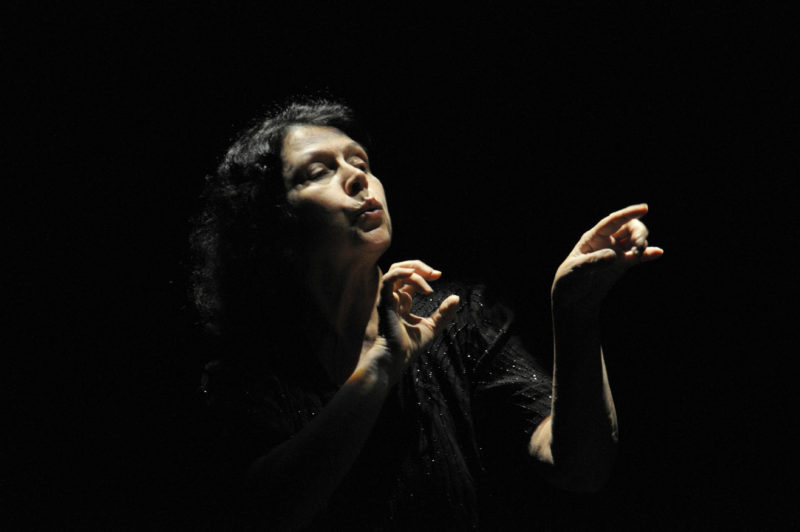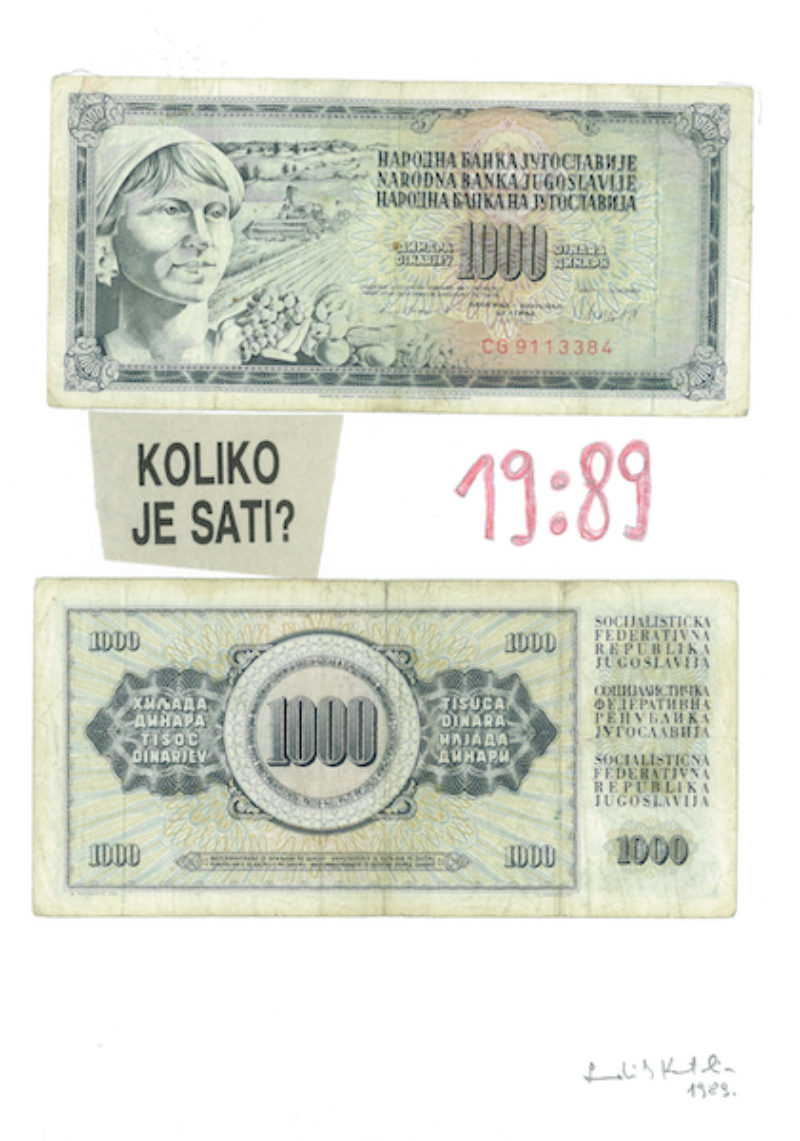The Total Art of Katalin Ladik

Jannis Van de Sande
Ever since the 1960s you have been incredibly prolific in a number of fields: (sound) poetry, acting, directing, writing, performance art, music and so on. How do these practices relate to one another in your work?
Katalin Ladik
For a few hundred years, until the early twentieth century, it was a generally accepted view that poetry, prose, theater, fine art and music were completely independent branches of art. However, I myself am a fan of "total art": I am trying to present a Gesamstkunstwerk in my performances. I will continue to write my poems in my mother tongue in linear form which can be read between four walls in a room. In the end it is always the intent - what I want to say - that determines which art form I express myself in. In my novelistic biography, entitled Élhetek az arcodon? (Can I Live on Your Face?), published in 2007, I already combined prose with visual art. It would be ideal if I could insert more links into my novel so that even sound would be an equal part of it. My ideal is a multimedia work. But unfortunately this is not feasible to have these days. The printed work is still linear, we cannot add an extra dimension to that.
JVS
You started out writing poetry in the 1960s. How was the creative climate back then in Yugoslavia?
KL
In the 1960s, the spirit of "socialist realism" dominated every art sector not only in Yugoslavia, but in all the surrounding socialist countries, too. My age group brought the breakthrough in literature with the support of one or two older poets. In Yugoslavia, the 1960s were a time of great revival; new, groundbreaking works of art, music and theater were born. I was fortunate enough to witness and actively participate in this change.
JVS
When did you start working on sound poetry? Was there a scene for this type of work at the time in Yugoslavia?
KL
Since the mid-1960s I have conceived some of my poems as sound poems. On public literary nights, I would perform these poems. My first volume of regular poems came out with a small vinyl record containing my sound poems (Ballada on the Silver Bike, Forum, Novi Sad, 1969). My poetry was surprising, even scandalous, for an audience accustomed to traditional literature, and my sound poetry was a great sensation, both in a negative and positive sense. Despite this, or perhaps for that reason, many people became interested in my poems and sound poetry.
JVS
Were you aware of the sound poetry being made in Western Europe by Henri Chopin and his peers and vice versa? I’m curious to hear if and how contact was maintained, given that Europe was divided at the time. Was there a strong sense of isolation or not at all?
KL
Until the late 1970s I did not travel to Western Europe and only visited Hungary a few times. The only information about European art came from browsing magazines and catalogues with my friends. From the late '60s onwards, exciting European and American avant-garde theater companies had guest appearances in Belgrade that impressed me. I also became acquainted with contemporary avant-garde music trends at Yugoslav music events. After the release of my Phonopoetica recording of voice poems in Belgrade in 1976, I became known abroad. Henri Chopin got this record and invited me to the International Festival of Sound Poetry in Amsterdam in 1977. From then on, the world opened up for me.
I have not experienced Yugoslav artists feeling isolated from the outside world. In some sense I found myself isolated, but this is natural if you are writing poems in a minority language, in Hungarian. Because of my linguistic minority status, I began to pursue sound poetry and visual poetry in the 1960s. In these arts, language barriers could be eliminated.
JVS
During the 1990s, Yugoslavia was of course held hostage by a terrible war for years. How did this affect your life and practice?
KL
In the 1980s, Yugoslavia was punished with embargo and isolation for its nationalist policy. Not only did this embargo hit the economy and the population of Yugoslavia, but it also hindered people from traveling abroad. It was exactly in this period that I could have reached the peak of my creative work and career, but due to the embargo, I could not accept invitations to international sound poetry and performance events, and my work was rarely seen abroad. So in the 1980s the international recognition of my creative work stalled, and during the war of the 1990s not only my artistic development but also my private life was deeply wounded. On the other hand, isolation and war have enriched my poems, prose, visual works, sound poetry and performance with new elements. My creative work took a new dimension.
JVS
Throughout your career you have lived many complex political situations. Has your work sought to engage with / comment upon them?
KL
Despite not being active in politics, I responded spontaneously to social phenomena in my artistic activity in the 1970s. The works and performances made in those years have been the subject of appalling criticism from the Communist Party of Yugoslavia and I have received severe political punishment for them. In 1970, I held a poetry performance in Budapest, which resulted in a severe punishment of those who invited me to the Attila József House of Culture.
JVS
In your work, sound poetry and performance are often closely related. Could you elaborate a bit upon their relation in your practice?
KL
At the beginning of my poetry activity in the 1960s, I wanted to expand the boundaries of written poetry towards visuality and sound poetry. I also considered the poet's personal presence important in the performance. I wanted to show the transformations and intermedial features of poetry in my "expanded" poetic performances. Therefore, the works presented in my exhibitions could be considered not only as works of fine art, but also as visual poems and graphic and musical scores which could be sung or played on an instrument. I can also say that my performances are primarily poetic, featuring visual art, sound poetry and gestural poetry.
JVS
You have been doing both sound poetry recordings and more traditional writing throughout more or less your entire career. Could you elaborate on your artistic relationship with language, which you both use and abuse/abandon in your work?
KL
I would like to recall my Alice in Codeland performance, where I quote a line from my favorite Hungarian poet, Attila József: “[S]he who wants to be a piper must descend to the depths of hell.” When I am descending in the world of barcodes and QR-codes in my performance I descend in the underworld of poetic language, in the realm of pains of discovery, creation, existence, indifference, rejection, and transience. These are the ultimate secrets of the language for me.
JVS
Finally, and somewhat related to this, a very open-ended question: how would you describe your voice’s status in your work?
KL
If the question is really open-ended, let me surprise you with my answer: I will recall my The Memory of Water performance presented a few months ago at Palais de Tokyo in Paris. I wanted to make my sound poetry heard, but not only heard: I wanted to make my voice "visible”. I used a kind of cymatic software that simulates the vibration of particles on the surface of the water. The audience could witness how the sound frequencies of my voice drew different mandala-like coloured shapes on my body dressed in white, projecting up close the live memory of water onto my moving figure, making the soundwaves “resonate” in everybody‘s memory. It was my looking glass into a hidden world of sound.
I realized that there is a direct connection between my voice and how my muscles react to it. My body responds to the sound waves, it resonates as a string. Sound shapes my body motion, it choreographs the movement. A bodily experience like sneezing or coughing moves the muscles, this everyday experience came first and then I took this experience into my sound poems, I invented the poetic expression of "voice-movement”, and the expression gradually became a recurring motif of my sound poetry. In my sound performances I am swallowing, ingesting, and then ejecting the air - a typical female motif. Inhaling and exhaling are the same. In my sound poetry, I not only use exhalation technique during sound formation, but inhalation as well. The sounds made with exhalation-inhalation show how the swallowed material filters through us. It has a sound both coming out and going in. Inhalation is the reverse of exhalation and has its meaning.
